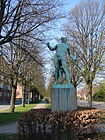Aksel Hansen
Aksel Hansen | |
|---|---|
 Portrait of Aksel Hansen by early Danish photographer Ludvig Grundtvig | |
| Born | 2 September 1853 Odense, Denmark |
| Died | 3 May 1933 (aged 79) |
| Resting place | Assistens Cemetery |
| Nationality | Danish |
| Education | Royal Danish Academy of Fine Arts |
| Known for | Sculptor |
| Notable work | Echo, 1888 |
Aksel Christian Henrik Hansen (2 September 1853 – 3 May 1933) was a Danish sculptor, one of the most productive of his times.
Biography
The son of a stonemason, Hansen was born in Odense, Denmark. After an apprenticeship with his father, he studied architecture at the Royal Danish Academy of Fine Arts (1876-1879). He exhibited at the Charlottenborg Spring Exhibition from 1880. He received the Hielmstierne-Rosencrone and the Ancker scholarships in 1888. He conducted study trips to Italy 1888-89 and to Greece 1904.
While following the classical tradition of Herman Wilhelm Bissen, he was also influenced by French Naturalism and the Art Nouveau style. This emerging trend can be seen in his masterpiece, Echo (1888), in Copenhagen's Rosenborg Castle Gardens, as well as in Gustav Lotze's tomb with its slender female figures in Odense's Assistens Cemetery. His statue of Uffe den Spage (1904), outside the Østerbro Stadium, shows how the Nordic character is reflected in ancient legends. Among his best known works are the six giants in the guardroom at Christiansborg Palace (1912) and the equestrian statue of King Christian IX (1912) in Odense's Royal Gardens.[1][2]
List of works
- Echo, Rosenborg Castle Gardens, Copenhagen (1888)
- Hans Tausen Monument, Birkende, Funen (1894)
- Christian IV, Odense Palace, Odense
- Ancient hunter, Dalgas Boulevard, Frederiksberg, Copenhagen
- Ambrosius, Frederick's Church, Copenhagen
Image gallery
- Echo
Rosenborg Castle Gardens - Ancient hunter
Frederiksberg - Christian IX
Odense
References
- ^ "Aksel Hansen", Den Store Danske. (in Danish) Retrieved 14 February 2012.
- ^ Karin Kryger, "Aksel Hansen", Kunstindeks Danmark & Weilbachs kunstnerleksikon. (in Danish) Retrieved 14 February 2012.



